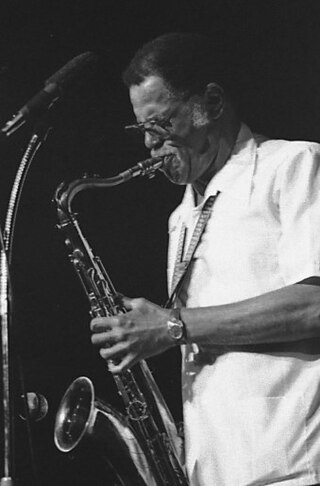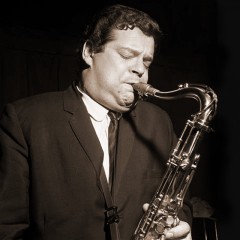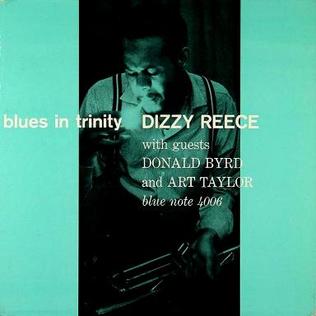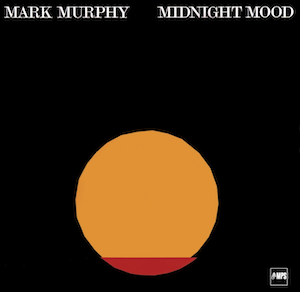
Dexter Gordon was an American jazz tenor saxophonist, composer, and bandleader. He was among the most influential early bebop musicians. Gordon's height was 6 feet 6 inches (198 cm), so he was also known as "Long Tall Dexter" and "Sophisticated Giant". His studio and performance career spanned more than 40 years.

The Modern Jazz Quartet (MJQ) was a jazz combo established in 1952 that played music influenced by classical, cool jazz, blues and bebop. The Quartet consisted of John Lewis (piano), Milt Jackson (vibraphone), Percy Heath, and various drummers, most notably Kenny Clarke and Connie Kay. The group grew out of the rhythm section of Dizzy Gillespie's big band from 1946 to 1948, which consisted of Lewis, Jackson, and Clarke along with bassist Ray Brown. They recorded as the Milt Jackson Quartet in 1951 and Brown left the group, being replaced on bass by Heath. During the early-to-mid-1950s they became the Modern Jazz Quartet, Lewis became the group's musical director, and they made several recordings with Prestige Records, including the original versions of their two best-known compositions, Lewis's "Django" and Jackson's "Bags' Groove". Clarke left the group in 1955 and was replaced as drummer by Kay, and in 1956 they moved to Atlantic Records and made their first tour to Europe.
James Deuchar was a Scottish jazz trumpeter and big band arranger, born in Dundee, Scotland. He found fame as a performer and arranger in the 1950s and 1960s. Deuchar was taught trumpet by John Lynch, who learned bugle playing as a boy soldier in the First World War, and who later was Director of Brass Music for Dundee.

Edward Brian "Tubby" Hayes was a British jazz multi-instrumentalist, best known for his virtuosic musicianship on tenor saxophone and for performing in jazz groups with fellow sax player Ronnie Scott and trumpeter Jimmy Deuchar. He is widely considered to be one of the finest jazz saxophonists to have emerged from Britain.
Alphonso Son "Dizzy" Reece is a Jamaican-born jazz trumpeter. Reece emerged within London's burgeoning bebop jazz scene during the 1950s and went on to become a leading proponent of hard bop jazz in New York City.

Dial Records was an American record company and label that specialized first in bebop jazz and then in contemporary classical music. It was founded in 1946 by Ross Russell. Notable artists who recorded for Dial include Charlie Parker, who signed an exclusive one-year recording contract with Russell on 26 February 1946, as well as Miles Davis, Max Roach, and Milt Jackson. Dial Records initially pressed its music for the Tempo Music Shop of Hollywood, California, but soon relocated to New York City.

James Moody was an American jazz saxophone and flute player and very occasional vocalist, playing predominantly in the bebop and hard bop styles. The annual James Moody Jazz Festival is held in Newark, New Jersey.
Philip William Seamen was an English jazz drummer.

4 Star Records was a record label that recorded many well-known country music acts in the 1950s. The label, founded after World War II, was home to singers such as Hank Locklin, Maddox Brothers and Rose, Rose Maddox, Webb Pierce, Cousin Ford Lewis and T. Texas Tyler, who all regularly issued records on the label, mostly as 78rpm singles.
Anthony John Kronenberg, known professionally as Tony Crombie, was an English jazz drummer, pianist, bandleader, and composer. He was regarded as one of the finest English jazz drummers and bandleaders, an occasional but capable pianist and vibraphonist, and an energizing influence on the British jazz scene over six decades.
Harry Percy South was an English jazz pianist, composer, and arranger, who moved into work for film and television.
William James Eyden was an English jazz drummer.
Jack Sharpe was an English jazz saxophonist and bandleader, chiefly active on the London jazz scene.
Ashley Kozak was a British jazz bassist, record producer and artists' manager, best known as having been Donovan's manager alongside Grahame Corbyn.

Charlie Parker on Dial: The Complete Sessions is a 1993 four-disc box set collecting jazz saxophonist and composer Charlie Parker's 1940s recordings for Dial Records. The box set, released by the English label Spotlite Records, assembled into a single package the multi-volume compilation albums the label had released by Spotlite on vinyl in the 1970s under the series title Charlie Parker on Dial. The box set has been critically well received. In 1996, a different box set collecting Parker's work with Dial was assembled by Jazz Classics and released as Complete Charlie Parker on Dial.

Blues in Trinity is an album by Jamaican-born England-based jazz trumpeter Dizzy Reece, recorded on August 24, 1958 and released on Blue Note the following year—his debut for the label.
Anthony Salvin Hall was a British music business executive, columnist, record producer, TV presenter and radio disc jockey.

Suite Sixteen is an album by vibraphonist Victor Feldman recorded in 1955 which was first released on the British Tempo Records and subsequently released on the Contemporary label in 1958.

Tubbs is an album by British jazz saxophonist Tubby Hayes. Recorded in June 1961 and released later the same year, Tubbs was the first studio album Hayes recorded under his recording contract with Fontana Records. The album features Hayes in both a quartet and big band setting, and includes two tracks on which Hayes moves to vibraphone.

Midnight Mood is a 1967 studio album by Mark Murphy.











